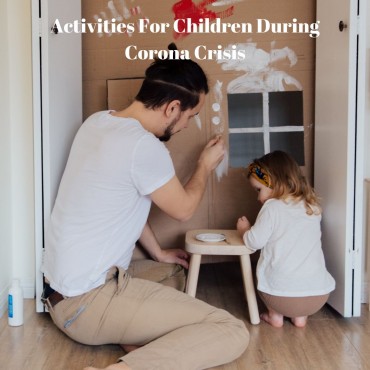Five year old Rohit walked around his classroom, aimlessly intimidating his younger friends, kicking them randomly for no reason and playfully smacking their backs. When confronted by his teacher, Rohit said “ I thought that’s O.K. as my dad always smacks me when we are together.” Here you have the case of an innocent five year old who has socially learned that it is ‘harmless’ to physically abuse others. The time spent with his dad left a detrimental impact which is very challenging to ‘unlearn’. It is a well established fact that how parents spend time with their children has an unfathomable impact on their holistic development.
The 21st Century has led to parents and children making digital connections when what they really need is human connections. The pace of a busy, rushed, sleep-deprived life of many parents had led them, particularly mothers to struggle with a juggle between work, home and family and the most scarred results are seen in children whose parents do not spend quality time with them.
There is a widespread assumption that parents should spend time with their children when the key is that they should be spending ‘quality time’ and not just ‘quantity time’ with children. Quantity time refers to the amount of time parents spend with their children. Quality time refers to the caliber or standard of time parents spend with children. It is a way of communicating love and letting the child know “ I love to be with you”. Children feel important as they connect emotionally and physically with the parent. Is it quality time when parents watch their favorite T.V. serial while their children play beside them? No!
Quality time is undivided attention : focused time spent with children where parents make eye contact, interact with children with verbal and non verbal gestures aimed at creating an engaging human connection with them. It is more beneficial to spend fifteen minutes of quality time with your child a day versus spending the whole day with them without making any quality connections. Let’s try and identify how we can spend quality time with our children this summer without losing our compass for what’s best for our children.
 For decades, the buzz words ‘quality time’ have been on the horizon of parental discussions and while more and more people are talking about spending quality time with their children, more and more children are starving for it. Dr. Gary Chapman, in his book ‘The 5 Love Languages of Children’ explains that spending quality time with children is one love language that can truly make your child feel loved, and love, as we all know, is a basic human need we thrive on. The absence of this feeling is responsible for several undesirable behaviors in children.
For decades, the buzz words ‘quality time’ have been on the horizon of parental discussions and while more and more people are talking about spending quality time with their children, more and more children are starving for it. Dr. Gary Chapman, in his book ‘The 5 Love Languages of Children’ explains that spending quality time with children is one love language that can truly make your child feel loved, and love, as we all know, is a basic human need we thrive on. The absence of this feeling is responsible for several undesirable behaviors in children.
Infants by default receive quality time from parents but as they grow older and more independent, giving them this requires a sacrifice on the part of parents as they have to give up something to be fully present with their child. As a child’s world widens to include, school, friends and other activities, spending quality time with the child becomes even more challenging. It requires a mindful parent who can consciously make an effort to do this.
The good news is that parents can spend time with their children anytime and anywhere to create these magical moments. It does not require any expensive commitment nor any unreachable resource to give this gift to your child. All it requires is a mindful commitment and a few ideas to spend quality time with your child. So make an effort to carve out this personal time in your schedule to make a lifetime investment for a healthy, happy, confident and loved child. Here are some ideas on how to get started :
Make Positive Eye contact and Body Language :
Browsing through your mobile phone and talking to your child about his favorite sport is not spending quality time with your child. What he needs is loving eye contact and body language that makes him feel you are with him. Not looking at your child while talking to him erodes his confidence and communicates that you are not really interested in him/her.
Have a Quality Conversation with your Child:
Show your child you care by talking about things that really matter to him/her. Find your child’s interests and passions and discuss them to convey that you care about what matters to your child. Weave in personal stories of your life that maybe relevant for your child as your experiences may serve a purpose in your child’s future interactions. It teaches them how to connect with others and create positive interpersonal skills.No matter how old your children are, they never grow out of the need for quality conversations. With young children, the best time to do this is before they go to bed when distractions are at a minimum.
Create Magical Moments Together
Make simple moments such as meal times and car drives special by interacting with your children, having a laugh together or simply making memories.
Make simple moments special! They are self calming and empowering for your child.
- Plan a family dinner once a week to create a bonding experience.
- Take your child to the park or playground, feed the ducks, walk together , push your child on a swing or simply play the simple ‘ run and catch game’ to create lifelong memories.
- Do household chores together- invite your children to bake a cake with you, make sandwiches or just do laundry and grocery shopping together. Spending personal time is not only quality time but also a time where you are nurturing life skills in your child.
- Involve older children in planning a holiday or a party
- Sing, paint and make a photo album together as a replacement to screen time
- Surprise your child with a ticket to his/her favorite movie or restaurant
- Plan a photo-booth session with your children
- Build sand castles at a beach, plan a camping weekend or simply play in the rain to have fun with your children.
- Read a book together, snuggle in the couch with hot chocolate or have a pillow fight
- Walk, swim, or skip together- not only are you spending quality time but also getting more fit and teaching your child the value of exercising.
So parents, its time to put on those seat belts and tuck yourself with ideas as you discover what groundbreaking research also supports : ‘How’ you spend time with your children and not ‘How much’ time you spend has far reaching positive impacts on children.






















































Comments